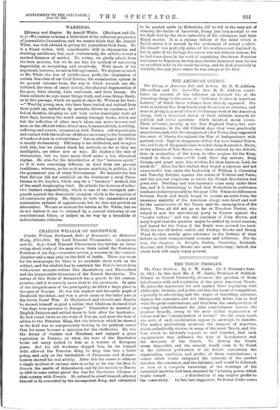THE AMERICAN CLERGY.
The Clergy in American Life and Letters. By D. D. Addison. (Macmillan and Co. Ss.)—The Rev. D. D. Addison contri- butes an account of the influence on national life of the American clergy to the series of "National Studies in American Letters," of which three volumes have already appeared. His work is entirely free from theological discussion or criticism, and aims at giving a general idea of the literary work of the American clergy, with a historical sketch of their attitude towards all political and social questions which involved moral issues. Their influence, notably in the New England States, has ever been immense; in the old Colonial days they were practically magistrates, and, with the exception of a few Tories, they supported the cause of liberty throughout the War of Independence with patriotic zeal. Typical clergymen of that day were Samuel Eaton, who led forty of his parishioners to battle from Brunswick, Maine, or the minister of Now Haven who, when ordered by the British, then in occupation of the town, to offer prayers for the King, obeyed in these terms :—" 0 Lord, bless thy servant, King George, and grant unto him wisdom, for thou knowest, Lord, he needs it." After the Rev olution they waged a vigorous and not unsuccessful war, under the leadership of William L. Channing and Timothy Dwight, against the tenets of Voltaire and Paine, and the general scepticism to which the French Revolution had given rise. Duelling and into mperance came early under their ban, and it is interesting to find that Methodists in conference condemned slavery as early as the year 1780. When the differences between North and South began to assume an acute form, the enormous majority of the American clergy were heart and soul for the maintenance of the Union and the emancipation of the slaves. True, all did not go so far as Theodore Parker, who helped to arm the anti-slavery party in Kansas against the "border ruffians" and was the confidant of John Brown, and many hoped that the question might be settled by moral suasion, and feared for the Union if the South were pressed too hard. With the war all doubts ended, and Phillips Brooks and Henry Ward Beecher merely gave utterance to the feelings of their fellows in their trumpet-toned sermons and addresses. For the rest, the chapters on Dwight, Parker, Channing, Bushnell, Beecher, and Phillips Brooks are most interesting ; indeed, the whole book will amply repay perusal.




















































 Previous page
Previous page